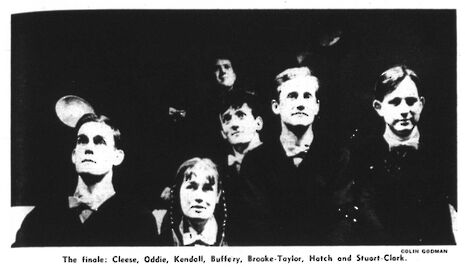The birth of Monty Python
Sarah-Jane Tollan takes to the Varsity archives to find where the comedy magic began

In 1963, the Footlights Revue, A Clump of Plinths, received rave reviews, and after being renamed Cambridge Circus, was transferred to the West End later that summer, before its members toured New Zealand and recorded a television special there. In September 1964, the Revue’s success created enough demand for it to run on Broadway, and its cast appeared on the popular The Ed Sullivan Show, performing a selection of their sketches. The troupe consisted of then unknown Cambridge students and graduates, now household names: Tim Brooke-Taylor, Bill Oddie, Graham Chapman (who replaced Tony Buffery when he left to pursue an academic career) and John Cleese. They would become part of a group that would make the University of Cambridge renowned as a cradle for comedy and the Footlights a springboard for many an aspiring comedian.
Yet even before the 1963 Revue, the Footlights was brimming with exciting and creative potentialities, most notably in the form of Peter Cook. Cleese, as Cook’s heir, confesses in his interview with Douglas Adams for Varsity in 1972 the overwhelming shadow that Cook made upon the Cambridge comedy scene: “Cook’s influence was so thick in the air for two or three years you could cut it with a knife. The way Cook uses words is really quite original – the way he can make a perfectly blunt and banal statement sound terribly funny, just by the choice of certain words. I remember Trevor Nunn, you know, of the Royal Shakespeare Company, he used to sit around and convulse us merely by recounting what sketches Peter had done.”
While Cook, who studied French and German at Pembroke College, would find success as one half of Cook & Moore, the heights that Cleese would reach through his partnership with fellow Footlighter Graham Chapman were only hinted at after the Revue’s success. Chapman was studying Medicine at Emmanuel College before deferring his studies to tour New Zealand, and Cleese was already signed up to a solicitors firm in London. (“They were going to pay me ten pounds a week and I was going to go to Guildford and take the crash course and get the solicitors exams and then come back to London and live on ten pounds a week for two years, I don’t know quite how.”) before he and Chapman were approached by the BBC at the Revue. In 1965, the comedy duo began to write for The Frost Report; the writing staff and performers that they hired to aid them in the endeavour included their Revue co-stars, Bill Oddie and Tim Brooke-Taylor, as well as Eric Idle, Terry Jones, and Michael Palin, names that would create and form the most internationally renowned British comedy group for several generations, Monty Python.
“I think it came out of the frustration we’d all suffered from working on things like The Frost Report, which we were all writing on together,” Cleese told Adams. “What was happening was that we frequently had ideas, sometimes of the Python type as it subsequently turned out, but we couldn’t do them because the producer would say, and this became a sort of catch phrase: ‘Funny, but they won’t understand it in Bradford’”.
The Footlight graduates of 1963 are not a lone example when making reference to the powerhouse that is the Cambridge comedy scene: Alexander Armstrong, Simon Bird, Richard Ayoade, Sandi Toksvig; the list goes on. To see their names in lights, their faces dancing on the screen is given another, humbling dimension when you see their name casually mentioned in a Varsity review from the 1980s, their features in the black and white camera of a student photographer. As Adams points out in his interview with Cleese: “I was aware of talking to someone else from Cambridge rather than a television star”.
 News / Cambridge academics stand out in King’s 2026 Honours List2 January 2026
News / Cambridge academics stand out in King’s 2026 Honours List2 January 2026 Interviews / You don’t need to peak at Cambridge, says Robin Harding31 December 2025
Interviews / You don’t need to peak at Cambridge, says Robin Harding31 December 2025 Comment / What happened to men at Cambridge?31 December 2025
Comment / What happened to men at Cambridge?31 December 2025 Features / “It’s a momentary expression of rage”: reforming democracy from Cambridge4 January 2026
Features / “It’s a momentary expression of rage”: reforming democracy from Cambridge4 January 2026 News / Varsity’s biggest stories of 202531 December 2025
News / Varsity’s biggest stories of 202531 December 2025









